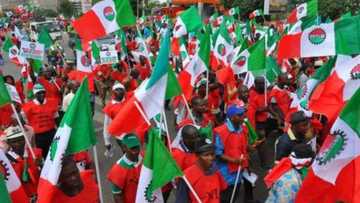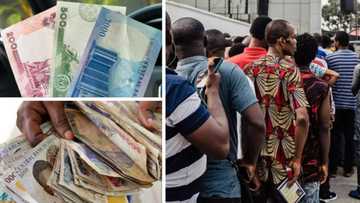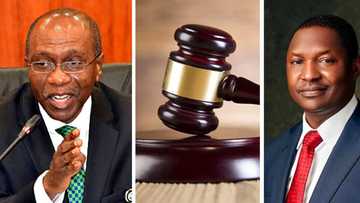Old Naira Notes: What CBN Policy Did to Abuja Residents
- Mixed reactions have continued to trail the Central Bank of Nigeria's reintroduction of the new naira notes
- This is as workers and residents of the Federal Capital Territory, Abuja, lament bitterly over the struggle of getting the old and new naira notes for use
- They however urged the management of the CBN to release as soon as possible the old and new naira notes to commercial banks
PAY ATTENTION: Сheck out news that is picked exactly for YOU ➡️ click on “Recommended for you” and enjoy!
It has been tough months for the majority of Nigerians following the cashless policy of the Central Bank of Nigeria and the redesigning of the Naira notes.
Despite adjusting the initial deadline and allowing the 200 Naira notes to circulate alongside the new notes introduced by the CBN, Nigerians had lamented the scarcity of Naira notes, saying it was becoming tough by the day, frustrating both their economic and daily activities.

Read also
"Despite billions spent, INEC failed to gain public trust": Group laments, encourages Igbos in Lagos to vote

Source: Facebook
Most Nigerians were made to face the crisis of engaging in normal business activities, especially market women and children who have no bank accounts.
On Monday, March 13, a CBN statement ordered banks to commence payment and receiving of the old Naira notes to customers until December 31st as ruled by the Supreme Court.
PAY ATTENTION: Follow us on Instagram - get the most important news directly in your favourite app!
This came after a presidency statement denied stopping the CBN from obeying the Supreme Court judgment that extended the deadline for the old Naira notes to December 31.
FCT workers lament Naira redesign/cashless policy
Prior to the latest decision of allowing the old notes as legal tender till December 31, workers and residents of the Federal Capital Territory, Abuja, had to struggle daily on how to report to their offices.
Majority of people who live in Abuja are civil servants who mostly go to work through public transport. During the period under review, they were made to face the extreme conditions of struggling daily in order to cope with transporting themselves to their offices. While some offices had the compassion of understanding with their staff for not being able to get cash to resume at their offices, others insist on prompt resumption to work on a daily basis.

Read also
Supreme Court vs FG: Strike looms as NLC issues fresh ultimatum to Buhari over naira, fuel scarcity
When Legit.ng interacted with some workers at the Federal Secretariat on Tuesday, March 14, to get their reaction on the latest CBN pronouncement, they heaved a sigh of relief, saying the policy was suppressing their productivity on a daily basis. The majority of the workers held the opinion that it was a good policy if backed up with workable technology.
Poor internet, mobile banking frustrated CBN, Emefiele
Mr. Anthony Ochekwu from one of the ministries at the secretariat argued that the CBN policy would have affected the people positively only if it was backed up by good internet and mobile banking.
He said:
"It would have worked. It was a good policy. The problem with the policy is the lack of readiness on the part of the commercial banks. Most of them could not cope with the innovation. Their mobile and internet banking were overwhelmed. Before you go into such a policy, you need to ensure commercial banks have all upgraded their platforms. Because if people are unable to withdraw cash, they should be able to transfer. In a situation where you can't use cash and you can't transfer, you are frustrated. And at that point, anything can happen."

Read also
Hundreds of Customers Troop to Banks as CBN Orders Recirculation of Old N200, N500, N1000 Notes
How Naira scarcity affected workers
Lamenting the cashless regime, another civil servant, Miss Mary Anthony said going to work was a daily struggle.
"You can clearly see when I'm returning to work. It's the result of this policy. I'm sorry, but the policy is not working for me. I had to practically beg a filling station attendant in the car conveying us to work to be able to get N1000 cash to pay for my T.p. In fact, the attendant gave me N800 after I had transferred the 1k. I'm not alone on this matter. This is what many people go through on a daily basis. People have money they can't spend. Spending actually drives the economy. You can only imagine what market women have been going through since."
Policy affects both poor, rich
But Mr. Dominic Sunday who works with a construction company in Utako, Abuja said this is the only policy that affected both the poor and the rich in the country.
He said,
"Oftentimes, government policy is one-sided. It's usually the ordinary man that bears the brunt, but this very one is different. Nobody had the cash, both the rich and the poor. Our saving grace is because Nigerian governors were affected and they fought get CBN for it."
It has been alleged at different quarters that cash stashed at home by some governors was the reason they fought the CBN even up to the Supreme Court.
But the governors have since denied the allegation, saying the policy was affecting the ordinary people in their states. Kaduna State Governor, Nasir El-Rufai had put up a defense in support of the governors on several occasions.
Lately, some Point of Sales, POS, operators, despite the cashless situation made brisk businesses. Those who made so much were those who have contacts at banks. Working so closely with some privileged bank staff, they charge as high as 300 Naira for N10,000.

Read also
Naira scarcity has cost Nigerian economy N20 trillion as CBN mops uP 70% of cash from circulation
A resident of Life-camp in Jabi, Miss Ene Augustine told Legit.ng that it was the most difficult time ever since she was born. According to her, there is only little one could do without cash at the moment. This cashless thing has dealt us a serious blow. The meat seller around my house has closed shop against us. The cobblers no longer come around. They don't have accounts with banks. To buy just pepper and salt is very difficult here.
Rights group cautions CBN
Reacting to the latest order of the CBN, the Human Rights Writers Association of Nigeria, HURIWA, in a statement by its coordinator, Emmanuel Onwubiko said it's expedient that the CBN makes cash available on time.
He said:
"Beyond rhetorics and reluctant compliance notice to banks, the CBN should immediately release new and old naira notes to commercial banks for onward and instant disbursement to millions of Nigerians who have been groaning on bank queues and have not been able to spend their hard-earned monies in the last three months.

Read also
Did Emefiele give money to Lagos LP guber candidate for election? Fresh details emerge as CBN reacts
“Many workers have not been able to go to work because there is no money for transport fares despite that these millions of workers have money in their bank accounts but can’t access it due to the wicked and anti-people policy of the government and the CBN especially. HURIWA also backs the Nigeria Labour Congress on its planned nationwide protest after its seven-day ultimatum on the naira crunch. Enough of impunity!”
Positives from CBN’s cashless regime
Despite the flaws of the regime, there are good sides to it.
Banks are said to be the most benefactors of the policy as people’s savings were trapped in financial institutions. Those who engaged in transferring funds had to pay different charges. A banker who does not want his name in print told Legit.ng that banks made so much money from just opening accounts for people who never had one before the introduction of the policy. This has further strengthened the banking sector.
Also, since the scarcity of the Naira notes, it has been observed by most analysts that crimes for cash have reduced drastically. Crimes such as armed robbery, burglary and kidnapping have reduced because people no longer keep cash at home.
But a security expert with Halogen who does not want his name mentioned said that crime rate is expected to rise following the extension of the deadline.
Meanwhile, it is yet to be seen if the old Naiara notes already returned to the CBN will still be sent back to the commercial banks and will be enough to go round in a short while. This will become clearer in a matter of days.
Femi-Fani Kayode calls Emefiele terrible names, reveals how the world will remember him
Following the reintroduction of the old naira notes back into circulation, former aviation minister, Femi Fani-Kayode has lambasted the Governor of the Central Bank of Nigeria (CBN), Godwin Emefiele for punishing Nigerians.

Read also
Cash scarcity: Kogi to arrest, prosecute persons, businesses rejecting old naira notes as CBN remains silent
Fani-Kayode, in a tweet called Emefiele different names, insisting that posterity will judge him harshly over the money redesign.
"When he dies the following words shall be written on his gravestone:"
Source: Legit.ng

Esther Odili (Politics and Current Affairs Editor) Esther Odili is a journalist and a Politics/Current Affairs Editor at Legit.ng with 6+ years of experience. She Holds OND and HND in Mass Communication from the Nigerian Institue of Journalism (NIJ), where she was recognized as the best student in print journalism in 2018. Before joining Legit.ng, Esther has worked with other reputable media houses, such as the New Telegraph newspaper and Galaxy Television. In 2024, Esther obtained a certificate in advanced digital reporting from the Google News Initiative. Email: esther.odili@corp.legit.ng.

Adoyi Ali Ali Adoyi is a prolific writer and a graduate of the Benue State University, Makurdi, Benue State. Adoyi holds a B.A Theatre and Communications Arts. He has bagged many awards both in academics and in journalism. Some of the awards are 10 years Journalism Merit Award, Best graduating student (Dept) Most Outstanding student (Faculty), and others. Adoyi can be reached here: adoyi.ali@corp.legit.ng



